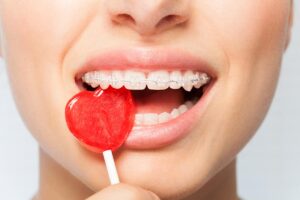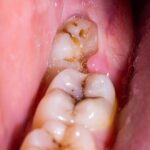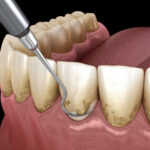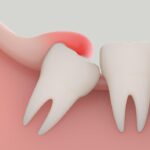Why Do My Gums Hurt in One Spot
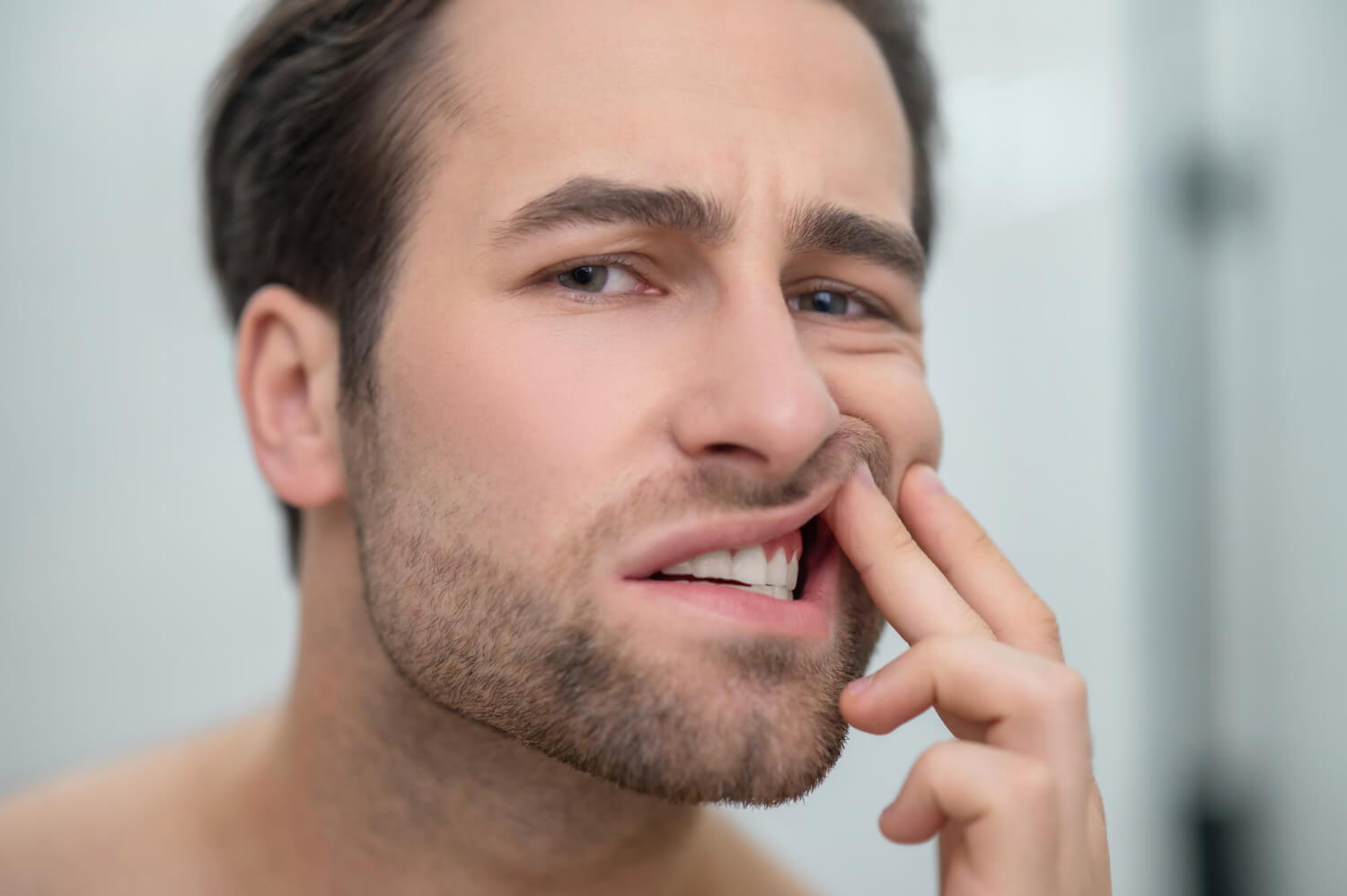
Gum pain in one spot can result from several issues such as gum disease, recession, dental abscesses, food particles trapped between teeth, trauma to the gum tissue, cavities near the gum line, or pressure from orthodontic appliances. These conditions can cause inflammation and sensitivity in a specific gum area.
Table of Contents
Why Exactly Do My Gums Hurt In One Spot?
Gums hurting in one spot can be due to various reasons, ranging from simple issues that can be easily remedied to more serious conditions that require professional dental care. Here are some common causes:
- Gum disease: Early stages of gum disease, such as gingivitis, can cause pain in specific areas. If left untreated, it can progress to more severe forms like periodontitis, affecting the bone and leading to tooth loss.
- Canker sores: These small, painful ulcers can appear on the gums and might be the reason for localized pain. Their exact cause is unknown, but they can be triggered by stress, hormonal changes, or certain foods.
- Gum injury: Injury from brushing too hard, flossing, or biting into something hard can cause localized pain in the gums.
- Tooth abscess: An abscessed tooth, which is a severe infection, can cause significant pain that might feel like it’s originating from the gums. This condition requires immediate dental attention.
- Food impaction: Food particles getting stuck between your teeth and gums can cause discomfort and pain in a specific spot. This is often relieved by thorough flossing.
- Wisdom teeth: Pain in the back of your mouth could be due to your wisdom teeth, especially if they’re impacted or coming in.
- Dental appliances: Braces, dentures, and other dental appliances can sometimes cause sore spots on your gums.
- Hormonal changes: Hormonal fluctuations, such as those during pregnancy, can make your gums more sensitive and prone to pain.
For a precise diagnosis and treatment, consult with a dentist, especially if the pain persists, is severe, or is accompanied by other symptoms like bleeding, swelling, or fever.
How Can I Treat Localized Gum Pain?
Treating localized gum pain often depends on the underlying cause, but there are several general approaches you can take to alleviate the discomfort.
Here are some suggestions:
- Maintain good oral hygiene: Brush twice a day with a soft-bristled toothbrush and fluoride toothpaste. Floss daily to remove plaque and food particles between your teeth and gums.
- Saltwater rinse: Dissolve a teaspoon of salt in a cup of warm water and gently swish it around your mouth for 30 seconds before spitting it out. Saltwater is a natural disinfectant that can reduce inflammation and kill bacteria, helping to relieve gum pain.
- Cold compress: Apply a cold compress or an ice pack wrapped in a towel to the outside of your face over the painful area. This can help reduce pain and swelling.
- Avoid irritating foods: Steer clear of hard, spicy, salty, or acidic foods that might aggravate your gums. Opt for soft foods that are easier on your mouth.
- Over-the-counter pain relievers: Nonsteroidal anti-inflammatory drugs (NSAIDs), like ibuprofen or acetaminophen, can temporarily reduce pain and inflammation. Use these medications as directed and consult with a healthcare provider if you’re unsure.
- Topical treatments: Over-the-counter gels or patches designed to numb the gums can provide temporary relief. These products often contain benzocaine or similar anesthetics.
- Hydration: Drinking plenty of water helps keep your mouth clean and can reduce pain.
- Quit smoking: Smoking can exacerbate gum problems and delay healing. If you smoke, seek help to quit.
- Manage stress: Stress can contribute to canker sores and other oral health issues. Techniques like meditation, deep breathing, and exercise can help manage stress levels.
When Should I See A Dentist For Gum Pain In One Spot?
In most cases, this type of pain is not something to worry about, but I do advise you to monitor your symptoms. Here are several situations where you should see a dentist:
- Persistent pain: If the gum pain lasts more than a week, even after trying home remedies, it’s time to see a dentist.
- Increasing pain: If the pain worsens over time instead of getting better, you should consult a dentist.
- Signs of infection: Symptoms such as swelling, redness, warmth in the affected area, pus, or a bad taste in your mouth indicate a possible infection that requires professional treatment.
- Fever: A fever accompanying gum pain could signal an underlying infection that needs immediate attention.
- Difficulty eating or drinking: If the pain is severe enough to interfere with your ability to eat or drink, see a dentist.
- Loose teeth: Pain accompanied by loosening teeth could indicate periodontal disease, a serious condition that needs treatment to prevent tooth loss.
- Bleeding gums: While some bleeding during brushing or flossing might not be unusual, persistent or excessive bleeding, especially in one area, warrants a dental check-up.
- Receding gums: If the gums around the painful area are receding, exposing more of the tooth or the tooth’s root, you should get a professional evaluation.
- Visible sores or lesions: Any sore, lesion, or lump on the gums that doesn’t heal or that grows over time should be examined by a dentist.
- Recent dental work: If you’ve had recent dental work (such as fillings, crowns, or implants) in the area that’s now painful, you may need a follow-up to ensure everything is healing properly.
- Swollen lymph nodes: Swollen lymph nodes under your jaw or in your neck, combined with gum pain, can indicate an infection that might require dental or medical treatment.
FAQ on Why Do My Gums Hurt In One Spot
How do you get rid of gum pain in one spot?
Rinse your mouth with warm salt water, apply a cold compress externally, use over-the-counter pain relief or topical numbing gels, and maintain good oral hygiene. If pain persists, see a dentist.
Why does my gum hurt in a specific spot?
Possible reasons include gum disease, canker sores, food impaction, tooth abscess, injury from brushing or flossing too hard, or emerging wisdom teeth.
Why do I have a painful spot on my gum?
This could be due to an abscess, infection, gum disease, a trapped food particle, or trauma to the area. Consult a dentist for a proper diagnosis.
How do I know if my gum pain is serious?
If the pain lasts more than a week, is severe, accompanied by swelling, bleeding, pus, or fever, or if you have trouble eating or drinking, it’s time to see a dentist.
Fact Checked
Our dedicated team rigorously evaluates every article and guide to ensure the information is factual, up-to-date, and free of bias.
Updated Regularly
We update our articles and reviews regularly to ensure you have access to the latest data in the dental industry.
The content on Dental3DU’s blog is intended for educational purposes only. This information should not be relied upon as professional medical counsel. Be sure to always consult with your dentist about the dangers and benefits of any medication, treatment or procedure.

